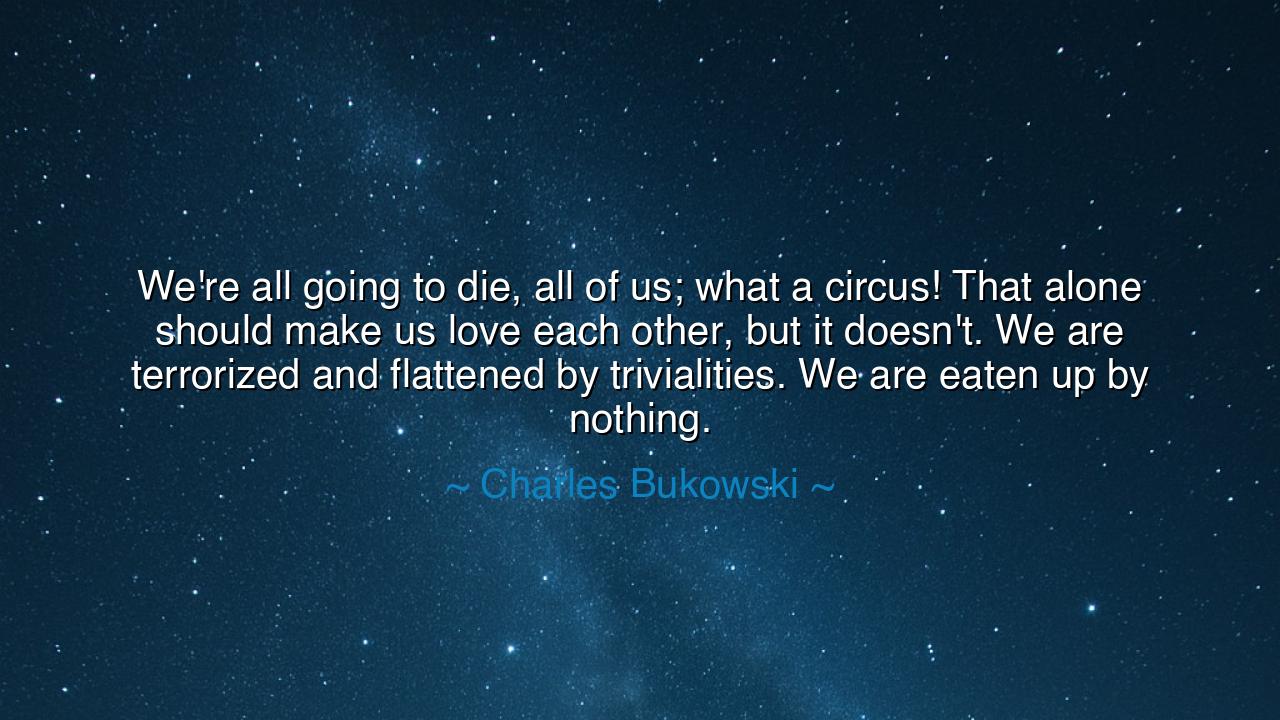
We're all going to die, all of us; what a circus! That alone
We're all going to die, all of us; what a circus! That alone should make us love each other, but it doesn't. We are terrorized and flattened by trivialities. We are eaten up by nothing.






"We're all going to die, all of us; what a circus! That alone should make us love each other, but it doesn't. We are terrorized and flattened by trivialities. We are eaten up by nothing." These words from the bold and raw voice of Charles Bukowski echo with an undeniable truth about the fleeting nature of human existence. In this poignant reflection, Bukowski points to the absurdity of life, where the certainty of death hangs over us all, and yet we are consumed not by this ultimate truth, but by the trivialities of our daily struggles. The circus of life, with all its chaos and distractions, blinds us to the deeper connection we all share in the face of our mortality.
Indeed, death is the great equalizer, the force that spares no one. Yet, instead of this truth drawing us closer together in love, compassion, and understanding, it often has the opposite effect. We become obsessed with the minutiae of life—our petty disputes, our egos, our ambitions—that we forget the fleeting nature of all things. The reminder of our shared fate, that we all must meet the same end, should unite us, but instead, it is often the cause of division. Bukowski's words speak to the tragic irony that, despite knowing we are all in this together, we are still driven by forces that pull us apart.
Consider, for a moment, the story of Socrates, the great philosopher who, when faced with the death sentence, did not falter. He had lived a life of questioning, of seeking truth, and in his final moments, he embraced the inevitability of his end with a clarity that most cannot fathom. He did not allow the trivialities of life—the fear of death, the opinion of others, or the pursuit of wealth and fame—to consume him. Instead, he faced death with dignity and acceptance, a reminder that the great questions of life are not found in the distractions of our fleeting days, but in the deeper understanding of who we are and why we are here. Socrates teaches us that when we recognize our shared mortality, we are liberated from the smallness of our worries and can rise to the fullness of our human potential.
Bukowski’s words also shed light on the paradox of human nature. While we are all aware of the inevitable nature of death, we often fail to live fully in the moment, drowning in the shallow waters of trivial concerns. The day-to-day struggles and desires, the fears and regrets, flatten us, paralyzing us in a cycle of insignificance. We are eaten up by “nothing,” by those distractions that hold no lasting meaning—fame, wealth, the pursuit of perfection—and in doing so, we miss the essence of what it means to be truly alive.
Look at the life of Viktor Frankl, a man who endured the horrors of the Holocaust yet emerged with a profound understanding of the meaning of life. Frankl, through his suffering, realized that while we cannot control when or how we die, we have complete control over how we choose to live. He found meaning in the most tragic circumstances by choosing to focus on what truly mattered: love, connection, and the strength of the human spirit. Even in the most terrifying of circumstances, he chose not to be consumed by trivialities, but to see each moment as an opportunity to love and live with purpose. Frankl teaches us that the acceptance of our mortality can free us from the fear that paralyzes so many.
From Bukowski’s sharp and cutting words, we learn that the realization of our shared mortality should push us to love one another more deeply, not less. The trivialities of life—our egos, our petty desires, our fleeting concerns—become less significant when viewed in the light of death’s certainty. In fact, the greatest antidote to the fear and anxiety that plague us is connection: the ability to see beyond the smallness of individual struggles and recognize our shared humanity. In the end, what really matters is not the battles we fight for personal gain, but the love and understanding we give to others.
The lesson, then, is clear: in the face of death, let us not be consumed by the distractions that seem so urgent but are in truth fleeting. Let us not waste time on trivialities, but instead, let us choose to love one another deeply, to connect with the greater meaning of life, and to live each moment fully. Death should not divide us; it should unite us in the recognition of our shared fate, and in the understanding that what truly matters is the love, kindness, and compassion we give in the time we are given. To live without fear of the inevitable, to live without being flattened by the smallness of our concerns, is to embrace the true fullness of life.






AAdministratorAdministrator
Welcome, honored guests. Please leave a comment, we will respond soon